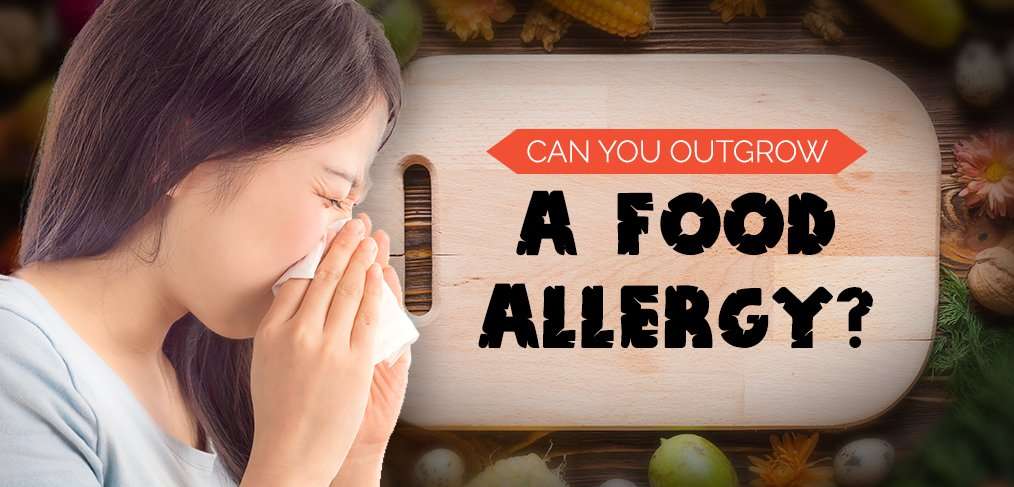My Child Will Outgrow Food Allergies
Eight percent of children less than two years old suffer from food allergies, and many go untreated due to the common allergy myth my child will outgrow food allergies. Well pause here and say that its not a complete myth; many children do indeed grow out of their food allergy. However Vijay Sabnis, MD, partner at Allergy Associates of La Crosse and contributing author of the La Crosse Method Protocol, explains why treating young children for food allergy early can have significant benefits.
First of all, true allergy is mediated through our immune system producing aberrant antibodies which interact with mast cells in the presence of an allergenic food. So, how do children simply outgrow an allergy? As children grow older and as their immune system matures, regulatory cells form that were not there before to control their aberrant response. By and large, the incidents and prevalence of allergy becomes less and less by the time they are 12 or 13 years old, advised Dr. Sabnis. The problem is, what do you do until then? Do you sit by and allow your child to suffer for the majority of their formative years?
Here Is Where This Myth Is Tested
While its true, 80% of children do outgrow their food allergy, the other 20% may not, due to a strong genetic history of allergy and other contributing factors. Additionally, even though the 80% may seem to have overcome their offending allergy, Dr. Sabnis explains that allergy may reoccur later on in life, whether its the same offending allergen or something completely different. For example, Dr. Sabnis says that a patient could experience milk allergy in infancy and outgrow it, to later acquire eczema, then allergic rhinitis, and then asthma, all due to allergy. The slow progression has been described as the atopic march. Knowing this progression is possible, Dr. Sabnis explains that treating allergy early on in a childs life is important so that it can be nipped in the bud so the patient doesnt have to deal with progressing allergies as his or her life goes on.
Immunotherapy is often recommended to treat the root cause of the disease and create a more positive and healthy way of life for patients.
When considering the needs of children, sublingual immunotherapy seems to be most beneficial and practical in comparison to other immunotherapy treatments. What can be simpler than taking one drop in your mouth under the tongue three times a day?
You can add this topic to the list of myths about allergy. Learn more about how allergy drops can help address your childs food and other allergies.
How Will I Know If My Baby Is Allergic To A Food
Always be sure to offer one potential food allergen at a time. When introducing potential allergens, offer a small amount to baby and watch for any allergic reactions over the next two hours. Allergic reactions are often presented in ways other than anaphylaxis, and you dont necessarily need to keep a medication on hand in case of a reaction. If your child does have a confirmed allergy you will then get a prescription from your pediatrician or allergist.
Ways an allergic reaction might present itself are :
- Hives this is what happened to my daughter
- Flushed skin or rash
- Face, tongue or lip swelling
- Vomiting and/or diarrhea
If any of these occur, notify your pediatrician and you will likely be referred to an allergist for follow-up testing. Work with your pediatrician or allergist to develop a treatment plan for your baby. Although up to 2% of children are allergic to eggs, about 70% outgrow the allergy by age 16 .
Anaphylactic reactions are rare in babies and very young children and most frequently occur from cows milk. In the small chance there is wheezing or shortness of breath after eating eggs or any other allergen, your baby should go to the hospital immediately .
Don’t Miss: Do Infants Have Allergies
How Should I Prepare Peanut Tree Nuts And Egg To Give To My Baby
The recipes are suggestions of how to prepare peanut, tree nuts, and egg for your baby, when your baby is ready for solid foods.
| Peanut, almond, cashew and hazelnut butters | Blend 15 mL of breast milk or warm water to 15 mL of smooth peanut butter. Blend until smooth and no lumps. Stir into 30 mL of infant cereal prepared according to package instructions.You can also stir the blended peanut or tree nut butter into 30 mL of fruit puree, such as banana or apple. |
| Hard-boiled egg | Blend or mash a hard-boiled egg with a fork. Add a few teaspoons of breast milk or water to moisten as needed. |
The recipes below are suggestions for preparing peanut, tree nuts, and egg when your baby is older and ready for more textures. Avoid offering whole peanuts and tree nuts or globs of peanut and tree nut butters. They are choking hazards for children until about 4 years of age.
| Peanut butter and tree nut butter on toast | Spread 15 mL of smooth peanut or tree nut butter thinly on a piece of toast. Cut into strips. |
| Scrambled egg | Beat together an egg and a small amount of water. Scramble in an oiled pan, until egg is completely cooked. Mash larger pieces of scrambled egg with a fork before offering to your baby. |
| French toast | Beat together an egg, 30 mL of milk and some cinnamon. Soak a slice of bread in the egg mixture. Fry each side of the bread in an oiled pan until the egg is completely cooked. Cut into cubes. |
Can Early Exposure Fix Food Allergies

For decades, allergists and pediatricians believed two things about peanut allergy. First: New parents should wait to introduce peanuts to children until they were past infancy to lower the risk of a negative reaction. Second: If a reaction did happen, and an allergy was confirmed through testing, the only safe measure for the 80% of kids who never outgrow this food aversion was strict avoidance of peanuts — for life.
While everyone agrees that a peanut allergy can trigger anaphylaxis — hives, respiratory distress, vomiting, and, in some cases, even death — guidelines are evolving on the other fronts, says Maria Garcia-Lloret, MD, a professor of pediatric allergy and immunology and co-director of the UCLA food allergy clinic.
“We now believe peanuts, which are not actually nuts but are legumes, should be given to babies as early as 4 months, when solids are first introduced,” she says. “It should not be the very first food a parent gives; I suggest mixing a little bit of peanut butter in some oatmeal. However — and this is critical — babies with eczema and other established food allergies are considered high-risk. For those kids, introduction to peanuts should be carefully monitored under the guidance of a pediatrician.”
You May Like: Claritin 24-hour Non Drowsy Allergy
Lifestyle Can Cause Food Allergies
Fear is playing a larger role in people developing food allergies from a young age. Parents are putting off feeding certain foods to their children out of worry over a potential allergic reaction, regardless of previous diagnosis. A study in England suggests that by children eating peanuts early, it might allow the immune system to develop better, avoiding allergies. Sometimes, that instinct to protect might lead to the immune system not developing the way it should.
Any Symptom That You Have After Eating A Food Is A Food Allergy
Food allergies do occur in roughly 8% of children, but many more parents think that their children have reactions to foods that aren’t really caused by allergic reactions. Instead, these children may have lactose intolerance, a food aversion, or other symptoms that have nothing to do with allergies, such as gas and hyperactivity.
Unlike food intolerances, true food allergies occur when a food triggers an immune system-mediated reaction. This reaction involves the antibody IgE , which causes certain immune system cells to release histamine, leading to most of the symptoms of a food allergy.
Read Also: Cyrtec
Treatment Of Food Allergies
Food allergy treatments;depend upon the type of food to which the patient is allergic and the degree to which he or she is allergic. Individuals who are seriously allergic to a certain food might not benefit from any food allergy treatments at all.
Allergy shots are not used to treat food allergies.; On the other hand, allergy shots are great at helping with nasal allergies like hayfever, including itchy and watery eyes, asthma control and even eczema.
Q : How Can People With Food Allergy Manage Their Condition
People living with food allergy can learn to manage their condition with the guidance of their clinical immunology/allergy specialist. For people who are at risk of anaphylaxis, having an adrenaline injector and ASCIA Action Plan for Anaphylaxis can provide reassurance, but this is not a substitute for strategies to minimise the risk of exposure. Strict avoidance of confirmed food allergens is essential in the management of food allergy.
It is important for people with food allergy to:
- Know the signs and symptoms of allergic reactions and know what to do when a reaction occurs.
- Read and understand food labels for food allergy.
- Tell wait staff that they have a food allergy when eating out.
- Be aware of cross contamination of food allergens when preparing food.
- Carry their adrenaline injector , and ASCIA Action Plan at all times.
Also Check: Claritin Tablet
Recommended Reading: How Much Local Honey To Take For Allergies
The Course Website And Blog For The Fall 2016 Instance Of Penn State’s Sc200 Course
In the fall of 1997, my mother was shocked to discover her baby could not ingest formula without getting sick. Regardless of the brand or type, I still could not drink it. She was very concerned and confused and went to multiple doctors to discover the reason. After visiting several doctors, my mother concluded that I have a severe milk allergy. Throughout my entire life, I have had to avidly avoid dairy products such as ice cream, chocolate, yogurt, cheese, etc. Doctors repeatedly told me that, with age, I would outgrow my allergy. However, the exact opposite occurred. The severity of my reactions worsened to now being practically fatal.
So why do some children outgrow their allergies while others like myself do not? Studies suggest that 60-80% of children will outgrow a dairy allergy by age 16, 20% of children will outgrow a peanut allergy, and 4-5% will outgrow a shell fish allergy. However, if a person contracts multiple allergies than his chances of outgrowing the sensitivity are slim. Unfortunately, it is very common for a child to be born with more than one allergy. Along with dairy, I was also allergic to eggs and soy but outgrew both.
Unfortunately for me, I am still allergic to milk at age 19. I will most likely be allergic for my entire life. Certain allergens are easier to outgrow than others and some are actually permanent.
How Common Are Food Allergies
True food allergy affects about 4-8% of children, and some grow out of it. As a result, food allergies affect about 2-5% of adults. Theres been a significant increase of food allergies in the last 10 years or so. There are a few theories for this rise, and its likely a combination of these theories thats contributing to the rise in food allergies:
- One is the hygiene hypothesis. This asserts that because the environment has become cleaner and were disinfecting things more regularly, kids immune systems arent as distracted by responding to frequent infections. Instead of responding to those infections, their bodies may respond by developing new allergies instead.
- Another theory is that children are exposed to food proteins through the skin. Children can then become sensitized to that allergen, and it can cause a response later when they eat the food.
- A third theory is attributed to pediatric guidelines from many years ago that advised children shouldnt be introduced to historically allergenic foods at a young age. Not having these foods in kids diet early on may have contributed to the rise of allergies.
Also Check: Allergy Pills Claritin
Peanut And Tree Nut Allergies
Peanut and tree nut allergies are often studied together because about 40% of children are allergic to both. About 20% to 25% of children naturally outgrow their peanut allergies, whereas only 9% of children outgrow tree nut allergies.;
In both cases, having lower IgE levels of smaller wheals on skin prick testing predicted a higher chance of outgrowing the allergy.;
Even though peanut and tree nut allergies overlap, outgrowing a peanut allergy does not mean a child will outgrow their tree nut allergies. Each food has to be considered separately.;
What Other Foods Should I Offer My Baby

In addition to the common food allergens, offer your baby other foods, especially foods rich in iron. Offer iron rich foods 2 or more times each day. Examples include:
- Well-cooked meat, poultry, and fish
- Cooked egg, lentils, beans, and tofu
- Iron-fortified infant cereal
Some common food allergens are also sources of iron. These include peanut, tree nut, and sesame seed butters.
Yogurt and cheese are recommended for your baby starting at 6 months of age. You can offer pasteurized whole cow milk to drink when your baby is 9 to 12 months of age and is eating a variety of foods that are high in iron.
Also Check: Pollen Count Lilburn Ga
Only Certain Foods Can Cause Food Allergies
It is true that only certain foods are most likely to cause food allergies, but children can be allergic to almost any food, including many fruits and vegetables . The foods that are most likely to cause food allergies, so-called “allergy foods,”;include eggs, milk, peanuts, nuts, soy, wheat, fish, and shellfish.
What Are The Guidelines On Feeding Children Peanuts At An Early Age
In 2015, a study called LEAP looked at giving children peanut products at an early age. The study found that feeding children peanut products between age 4 and 11 months was beneficial. In patients who ingested peanut products three times per week, the number of peanut allergies decreased from 14% to 2% by age 5.
For parents with a child who has severe eczema or prior egg allergy, consult with your child’s pediatrician and potentially have an allergy test done before introducing peanuts.
Read Also: Is Twix Peanut Free
Did I Outgrow Food Allergies
All that we can say with certainty right now is what I wrote above. I reacted to two tree nuts and didnt react to peanuts, sesame seeds, almonds, brazil nuts, walnuts, and pecans.
Does this mean I can go out and eat peanuts and almond butter? NO.;Does this mean I can have a bite of pecan pie at Thanksgiving? NO.Does this mean my husband will start eating the foods Im allergic to? NO.Will I still tell restaurants Im allergic to the foods I tested negative for? LIKELY.
These results wont change ANYTHING in my current life, except give me the slightest bit of peace of mind.
Food Allergy Update: Can You Outgrow Food Allergies
For as long as I can remember Ive been the girl with allergies. As much as I didnt let it define me, it was definitely a part of my identity.
So much so that I became a dietitian and now help others with allergies in my private practice and through the allergy-friendly recipes I share.
So what happens when you OUTGROW some of your allergies?! Utter disbelief, thats what!
I cannot believe at 30 years old I outgrew SEVERAL of the allergies Ive had since I was two years old.
Don’t Miss: Robitussin Sinus
Cultural And Religious Diets
Many cultures hold some food preferences and some food . Dietary choices can also define cultures and play a role in religion. For example, only are permitted by , foods by , and in is restricted. In addition, the dietary choices of different countries or regions have different characteristics. This is highly related to a cultures .
Gut And Skin Connection
A recent study found that scratching your itchy skin irritated by eating foods triggers your immune cells in your small intestine. The scratching sets off a gut reaction. This situation is why there may be varied reactions in people with food allergies. Your food allergy can set off atopic dermatitis or stomach problems or both. You may get a skin rash from foods without a stomach reaction, but some researchers suggest that if you have one result, you are prone to the other response. So, what are common food allergy symptoms? Here is a list you may encounter if youre allergic to certain foods:
- sneezing
You May Like: Zertyc
Food Allergies In Adults
Adults can develop food allergies as well. You might have a reaction to something randomly or even to something to which you were previously allergic. Avoid any food that causes you to have a reaction, and contact your doctor to learn more about the possible allergy.
If you have allergy symptoms or think that you may have outgrown an allergy, ask your doctor to confirm it.
Kids Won’t Outgrow Their Food Allergies

It depends on what they are allergic to, but kids actually can outgrow many food allergies if they completely avoid them for two or three years. For example, about 80% of children outgrow allergies to milk, but fewer outgrow allergies to peanuts, tree nuts or seafood.
Still, about 20% of children may outgrow their allergy to peanuts.
Recommended Reading: Robitussin Allergic Reaction

